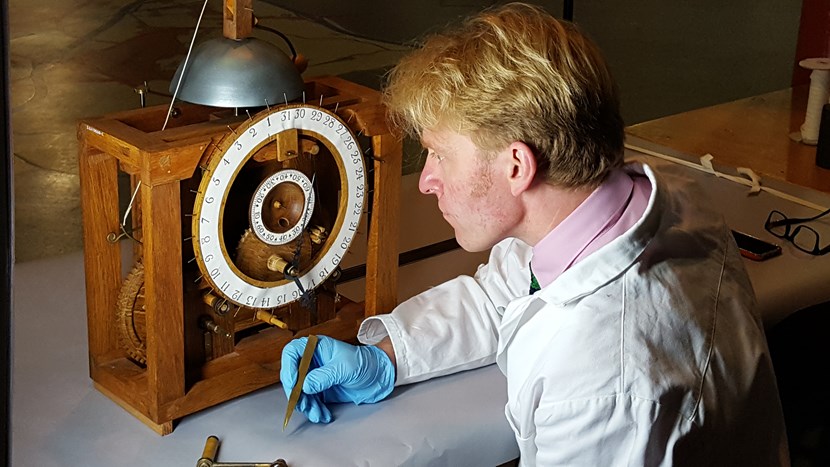
04 Oct 2018
Time for a tune-up for the clock designs that changed the world
Their unerring precision and reliability were the key to solving a puzzle which had baffled seafarers for centuries.
But it seems even the historic designs of world famous Yorkshire clockmaker John Harrison aren’t immune from the impact of Father Time.
Staff at Leeds City Museum recently noticed that their intricate pendulum mechanism, a faithful replica of the invention pioneered by the renowned Harrison centuries ago, had mysteriously stopped ticking.
The fascinating pendulum is on loan from Royal Museums Greenwich’s National Maritime Museum and is displayed alongside an authentic, beautifully ornate 18th Century timepiece built by Harrison and his brother in 1727.
Keen to get the mechanism back up and running, the museum quickly drafted in Matthew Read, an expert from The Bowes Centre for Art, Craft and Design in County Durham, who travelled to Leeds to try and diagnose the problem.
Matthew said: “I like to use the term “approach” the object because it is literally and emotionally just that. All objects are subject to agents of deterioration. Clocks have the added compounded issue of wear and damage due to their operation.”
The museum’s distinctive Precision-pendulum Clock No 2 and its designs are particularly noteworthy for their role in revolutionising the way sailors navigated on perilous journeys around the globe.
In 1714 the British government had offered the princely sum of £20,000, the equivalent of around £3m today, for anyone who could come up with a way of accurately determining longitude.
Not being able to do just that had caused numerous ships to get shipwrecked, costing shipping companies a fortune in lost lives and cargo.
Harrison, who was born in Foulby, near Wakefield, knew if he could find a way of precisely telling the time on the shifting seas, he could solve the problem, so began making a series of precision clocks, each one more accurate than the last.
Eventually this led to the invention of the Precision-pendulum Clock No 2, which was unprecedented in its accuracy. That in turn led Harrison to further refinements and portable versions, culminating in the sea watch H4 which won a triumphant Harrison the much-coveted prize.
The on loan pendulum piece, an authentic modern replica of the clock’s original workings, allows the original clock to be displayed as it was made.
Matthew added: “John Harrison used land-based clocks as experimental test-beds for resolving two of the main issues facing all clockmakers wishing to make their clocks more accurate. In history, he was and still is the only maker to successfully achieve this.
“The second breakthrough was Harrison’s use of dissimilar metals in the pendulum to provide compensation for temperature change. Harrison’s later refined version of this, the bi-metallic strip has been used in millions if not billions of applications since. In all these are very cool clocks and a privilege to work on them.”
Harrison became a world-renowned name in his field for the rest of his days and died on March 24, 1776 at the age of eighty-two, just before his eighty-third birthday.
Centuries later, at a dinner at 10 Downing Street, Neil Armstrong, the first man on the moon, proposed a toast to John Harrison, saying his invention enabled men to explore the earth, which gave them the courage to voyage to the Moon.
Following today’s observations, Matthew will now write a report and treatment proposal to hopefully get the piece working again.
Leeds City Museum on Millennium Square is free to enter. For more details, please visit: https://www.leeds.gov.uk/museumsandgalleries/leedscitymuseum
ENDS
For media enquiries please contact:
Stuart Robinson
Communications Officer
Leeds City Council
Tel: 0113 378 9182 (please note my new number)
Email: stuart.robinson@leeds.gov.uk
www.leeds.gov.uk
For media enquiries contact:
Leeds City Council Communications team
communicationsteam@leeds.gov.uk